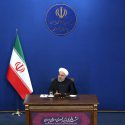It’s understandable that Germany wants to evade the defense commitments demanded by the US
Celebrations in Washington marking the 70th anniversary of the founding of NATO have ended with mixed feelings. On the one hand, the North Atlantic Alliance is growing and thriving, and its military might is still a decisive factor in global politics. On the other hand, the Alliance is being fractured by more and more internal contradictions that not even its celebratory rhetoric could conceal.
Surprisingly enough, one of the “problem states” in NATO is Germany, a country that for decades was seen as a stronghold for trans-Atlantic relations in the EU. German Foreign Minister Heiko Maas faced harsh criticism from the US leadership at the anniversary celebrations in Washington. US Vice President Mike Pence described Germany as “chief” among the NATO contribution laggards and again called on Berlin to increase its military spending.
Germany has been a NATO member since 1955. At that time, membership in the Alliance was the alternative to the project of a European defense community, which had been defeated by the French National Assembly. Under Konrad Adenauer, the German government was seeking to integrate into the community of Western nations as quickly as possible, and one way of achieving this was through a security alliance. The Korean War had convinced German politicians that only a collective defense strategy could protect their republic from potential aggression.
The frontline of the Cold War ran to West Germany’s east between two antagonistic superpowers. The German Army had almost half a million men and several million reservists. It was regarded as one of Europe’s strongest armies and would have been the first to be sent out against Soviet bloc troops in the event of a comprehensive armed conflict on the continent.
After reunification, Germany’s position within NATO shifted. The country’s eastern border lost its status as a constant source of military menace. Eastern European countries sought integration into the West and saw Berlin as an important partner and guide along the way.
After Poland and the Czech Republic also joined NATO, Germany moved to a back seat in the Alliance. Its neighbors were now either military allies or neutral countries. The Bundeswehr’s focus moved from territorial defense towards more remote international missions, among them the protection of Germany’s security from the Hindu Kush.
The necessity of NATO in its original peacekeeping role has been under discussion in Germany since the early 2000s. Surveys have found that a significant proportion of Germans are unsure about what NATO’s goals currently are.
The terror attacks of September 11, 2001, temporarily restored NATO’s spirit of a military community facing a common enemy. Yet, just two years later this unity was overshadowed by differences of opinion over Iraq. German Chancellor Gerhard Schröder’s resistance to involvement in an armed engagement resulted in a tense relationship with US President George W. Bush and the first, albeit brief, cooling in US-German relations after 1990.
This did not stop Schröder from making the case for reforming NATO and strengthening its political functions. His ideas were read aloud by Defense Minister Peter Struck at the Munich Security Conference in 2003. As well as reinforcing the political components of NATO, the proposal was to strengthen the role of the European states in the Alliance and to scale back the US military presence in EU countries. Schröder’s proposals fell on deaf ears among the Christian Democrats, who after 2005 took over the federal chancellery and the defense ministry in the grand coalition, rendering them just a series of theoretical considerations.
When Angela Merkel took office, the German experiment with NATO ended almost before it had begun. The chancellor condemned her predecessor’s errors and reaffirmed a policy of consistently strengthening trans-Atlantic relations. NATO was firmly established in German government guidelines as one of the country’s most important foreign policy organizations. The size and might of the Bundeswehr and US military forces in Germany were gradually reduced, universal conscription was abolished, and any potential security threat was regarded as a very remote possibility.
Donald Trump’s transformation of the fundamentals of US foreign policy was as much of a surprise to the German establishment as was his election victory. The expert on “good deals” needed only a quick look at the achievements of US diplomacy to immediately identify some apparent “bad deals” encumbering the US government’s purse. In his eyes, one of these was NATO, whose European allies were minimizing their defense budgets while ensuring their security at Washington’s expense. Although there were many “debtors,” Trump’s wrath focused on the EU’s biggest economic powerhouse – Germany.
The US president was indignant that Berlin, in lieu of the required defense spending of 2 percent of GDP, was not even spending 1.5 percent. When the German government took on financial commitments in the context of the Ukraine crisis, it could hardly have expected a serious review of its compliance. The decision seemed to be more of an expression of solidarity among allies that had little to do with achieving practical goals. The German government was as willing to increase defense spending as were German soldiers to protect Lithuania from a Russian invasion.
In reaction to the criticism from its US ally, Berlin felt obliged to prove its usefulness to the Alliance. The German government appealed to Trump to focus less on formal indicators and more on concrete actions. Its main argument here was Germany’s participation in foreign missions with the Alliance, from Kosovo to Afghanistan, where Germany has the biggest force.
Why doesn’t Germany want to increase its defense spending? The reasons lie at the interface of the economy, foreign policy and security.
First, the called-for 2 percent of GDP would amount to the huge sum of around €80 billion a year. This is almost twice the military spending of France – a nuclear power with a high level of military activity in Africa. It is also currently not clear to Germany’s leadership how a bigger defense budget could be effectively implemented.
Defense Minister Ursula von der Leyen (CDU) has repeatedly been accused of lacking competence in financial management. While Germany’s first female defense minister has focused more on social issues involving the army, she seems to have lost sight of three critical areas: maintaining Germany’s military technology and artillery, adequately equipping German soldiers and modernizing the German forces. Experts are convinced that today’s Bundeswehr has the financing it needs to fulfill its ongoing commitments, although the use of financial resources leaves many questions unanswered.
Second, an increase in Germany’s military potential would inevitably cause unease among the country’s European neighbors. Any transformation of the economic giant into a military hegemon could bring back bad memories in Poland and France. Europe’s need for a strong Germany is primarily a need for a strong German economy, not a strong German army. NATO’s founding principle of “keeping the Germans down” may have lost some of its relevance, but there is not much evidence of any willingness by the EU, or by Germany, to admit it.
Berlin has thus far succeeded in evading any new financial defense commitments. Its draft military budget for 2023 even plans for a slight decrease. The German government’s activities are aimed at waiting out Trump’s tenure and then continuing the dialog with a less demanding leader in the White House. Chancellor Merkel has patiently tolerated accusations from her US colleagues and prefers to forego sharp rhetoric in her responses. Whether this tactic could withstand the four additional years of a potential second term for Trump remains to be seen.
Artem Sokolov
lectures at the Moscow State Institute for International Relations.



